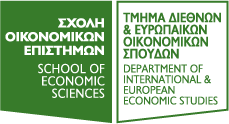Game Theory and Applications
Course Code:
4123
Semester:
5th
Specialization Courses
A. International Economics and Finance
Professor:
Type of course: Compulsory for the specialization “International Economics & Finance”
Number of credits allocated: 6 ECTS Credits
Expected learning outcomes and competences to be acquired
- Understanding the usefulness of game theory and its notions in the analysis of strategic environments
- Ability to employ game theoretic analytical tools to solve strategic problems
- Apply game theoretic tools in the analysis of various economic applications, such as oligopoly, bargaining, auctions, etc.
Prerequisites: None
Course contents
- General introduction
- Normal form representation of games and the notion of dominance
- Nash equilibrium in pure and mixed strategies II
- Extensive form representation of games
- Backwards induction and subgame perfect equilibrium
- Bargaining
- Repeated games
- Games of incomplete information (Bayesian games)
- Dynamic games of incomplete information (Signaling games)
Recommended reading
- Robert Gibbons (1992), A Primer in Game Theory, Harvester Wheatsheaf: London (This is the main textbook of the course)
- Drew Fudenberg and Jean Tirole (1991), Game Theory, MIT Press (This is a much more rigorous and technical introduction to game theory. It is only proposed as a reference to those who want to get a more in-depth look at the subject.)
- David Kreps (1990), Game Theory and Economic Modelling, Oxford University Press (This is a nice monograph which discusses the strengths and limitations of applying game theory to economic problems.)
Teaching methods: Lectures and distribution of take-home problem sets
Assessment methods: Final written exam
Language of instruction: Greek or English





 Patision 76
Patision 76 2108203 106 / 2108203 107
2108203 106 / 2108203 107 
